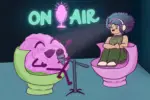Jamie Loftus is a comedian best known for her standup show “Boss Whom is Girl” and her writing on television shows like Adult Swim’s “Robot Chicken.” She can also be found watching films through a feminist lens with co-host Caitlin Durante on “The Bechdel Cast.”
Within the last year and a half, however, Loftus has branched out from her usual haunts to create three outstanding podcasts, each of which has a distinctive focus and tone. All three podcasts feature subject material personal to Loftus and range from her personal experiences to media that she interacted with in her youth.
1. “My Year in Mensa”
“My Year in Mensa” is a four-part miniseries in which Loftus details her experience with Mensa, the oldest high IQ society in the world.
Loftus initially took the Mensa exam as a joke while writing an online column that poked fun at the exclusive nature of the group and the superiority complexes of its members. Ten days later, much to Loftus’ surprise, she qualified for admission. She announced this officially in a now-infamous article titled, “Good News, They Let Dumb Sluts into Mensa Now,” which irritated a great number of Mensans. Many of them took to Firehouse, an unmoderated Facebook group, to tear Loftus apart for her words. Loftus tweeted about the harassment without blurring the names of the Facebook users, which angered them more, some even going so far as to send her terrifying death threats.
All of these events eventually culminated in Loftus spending an uncomfortable and stressful weekend with over 2,000 Mensans at the 2019 Mensa Annual Gathering in Phoenix, Arizona. She recalls coming face to face with those who spearheaded the online hate campaign against her, some of whom appeared to be nicer in person (when they’re not shielded by a screen) and others who were just as hateful. She shares how it felt to attend the Firehouse party while surrounded by people who disliked her so much that they actively kept their backs to her the entire time.
For those looking for a quick but engaging listen, “My Year in Mensa” is an enthralling story that seeks to critique a decades-old organization built on superiority complexes and hate speech.
Loftus shares her story honestly, making sure to recognize her own faults in the situation as well as holding far-right members of the organization accountable for their many wrongdoings. She also introduces comedy to a complicated and difficult situation, making ample use of both her own sense of comedic timing as well as a slew of airhorn and “Jeopardy” sound effects.
2. “Lolita Podcast”
(Content Warning: It should be noted that the podcast does contain explicit discussions of pedophilia and child sexual abuse (CSA). Listener discretion is advised.)
“Lolita Podcast” is Loftus’ second solo entry into the podcasting medium, and it’s much more serious. Loftus explores the public’s misreading and misconceptions of Vladimir Nabokov’s “Lolita,” sharing her own experiences with the text as well as interviewing other survivors of CSA about their own. Loftus is incredibly well-researched: Each episode description contains links to all of the material discussed or referenced, and she takes a great deal of care when discussing sensitive material.
Throughout the series, Loftus seeks to understand why exactly the public perception of “Lolita” has become so skewed.
“I’ve been trying to figure out how to address how huge an impact this book had on me as a kid, and continues to now,” Loftus told The A.V. Club. “I’m definitely not alone there, and this pod felt like the right opportunity to really take a look at how a book that tells you on its first page that it’s being narrated by a pedophile trying to get himself out of prison time can be interpreted in so many bad faith ways.”
In the first episode, Loftus takes the time to explain the plot of the novel in detail for listeners who are unfamiliar with it or need a refresher. In later installments, she goes on to discuss Nabokov’s background, “Lolita” fan communities and the lives of the different women who portrayed Dolores Haze in various adaptations of the novel.
She also discusses the negative influence that these misinterpretations have had on the public’s perception of “Lolita,” specifically criticizing the 1962 and 1997 film adaptations, tracks from Lana Del Rey’s discography and even the bizarre musicals for romanticizing the pedophilic relationship between Dolores and Humbert.
3. “Aack Cast”
Last but certainly not least, “Aack Cast” is Loftus’ newest podcast about Cathy Guisewite’s “Cathy” comic strip. As of now, only three episodes of the podcast have been released. Named for the titular character’s most notable catchphrase, this series seeks to examine the public perception of the comic strip as well as dive into the history behind it.
“The critics of this comic portray Cathy the character as pathetic, as this caricature of womanhood. A woman who can’t lose ten pounds. A woman who can’t get a date. A woman who has an overbearing mother who’s too involved in her life well into her 30s,” Loftus explained in her first episode. “At her peak, the Cathy character was as loved by her fans for being terminally stressed out and overextending as she was hated by her detractors for being cringy and I am here to tell you that these haters, these detractors, simply have not read enough ‘Cathy’ comics.”
However, Loftus has. In fact, she spent last spring reading every single “Cathy” comic strip from 1976 to 2010. She uses this extensive knowledge to explain the entire storyline in detail, enlisting a cast of her friends to play each character. This makes the retelling extra entertaining and brings the story to life.
While many may remember Cathy as a baby boomer with some outdated values, Loftus wants listeners to consider the time period in which the comic came out. By providing listeners with historical context — the comic strip began during the second wave of feminism — it becomes easier to understand the character and the changing culture that she was navigating. Guisewite herself also appears as a guest in the second episode of the podcast (divided into Part 1 and Part 2), discussing how the comic strip came to be, its popularity and the misjudgments from others.
Upcoming episodes of the series will contain interviews with comic artists from various generations, women who were in the workforce when “Cathy” was at its most popular, diet culture experts and, of course, Loftus’ mother.

















